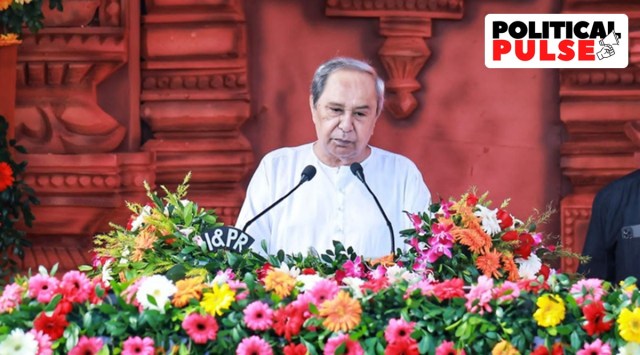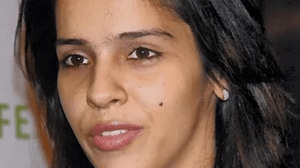Women’s quota Bill on course, BJD underlines how Naveen Patnaik ‘showed the way’
In 1990s, Biju Patnaik implemented 1/3rd quota for women in local bodies, Naveen expanded it; in last LS polls, Odisha CM rallied support for women's Bill, gave one-third tickets to women
 Apart from earning him laurels as a “progressive leader”, Patnaik's decision to give 33% of the BJD's Lok Sabha tickets to women in 2019 is believed to have helped the party consolidate its women vote, especially in rural areas. (Facebook/Naveen Patnaik)
Apart from earning him laurels as a “progressive leader”, Patnaik's decision to give 33% of the BJD's Lok Sabha tickets to women in 2019 is believed to have helped the party consolidate its women vote, especially in rural areas. (Facebook/Naveen Patnaik) ON MARCH 10, 2019, hours before the announcement of the schedule for the last general election, BJD president and Odisha Chief Minister Naveen Patnaik declared at a rally in Kendrapada that his party would give 33% of its tickets for the parliamentary elections to women.
“If India is to lead the world, if India is to be an advanced nation like America and China, then women empowerment is the only answer,” Patnaik said.
The BJD then went on to field women from seven of the 21 Lok Sabha seats in Odisha. In 2014, it had fielded just two and in 2009, when it fought in alliance with smaller parties like the NCP and Left, the BJD had 0 women in the race. While five of the BJD’s seven women candidates won in 2019, both its women candidates had emerged victorious in 2014.
As the Modi government brought in the women’s reservation Bill on Tuesday – planning to set aside 33% of the seats in the Lok Sabha and state Assemblies for women – the BJD welcomed the move “wholeheartedly”.
Of the most notable candidates fielded by the BJD in 2019 was a 70-year-old self-help group (SHG) leader from Aska seat, Pramila Bisoyi, who won by a margin of more than 2 lakh votes.
‘Progressive leader’ brand
Apart from earning him laurels as a “progressive leader”, Patnaik’s decision to give 33% of the BJD’s Lok Sabha tickets to women in 2019 is believed to have helped the party consolidate its women vote, especially in rural areas.
Rural women have traditionally been supporters of the BJD, with the party’s legacy of women-centric measures going way back. In the early ’90s, when still part of the Janata Dal, Patnaik’s father and former chief minister Biju Patnaik had introduced 33% reservation for women in local bodies in Odisha.
After the death of his father, Naveen Patnaik had floated the Biju Janata Dal. In 2011, as CM, he enhanced reservation for women in panchayati raj institutions in the state to 50%. The following year, his government enhanced quota in urban local bodies for women too to 50%.
In 2018, months before the BJD set aside 33% of its Lok Sabha tickets for women, Patnaik also made a strong pitch for passage of the women’s reservation Bill in Parliament. In November 2018, his government went ahead and moved a resolution in the state Assembly seeking 33% reservation for women in Assemblies and Parliament, which was passed unanimously.
In his speech on the occasion, Patnaik said: “New Odisha will move forward with much greater momentum, only if half of our population, our mothers and daughters, have a role in the highest decision-making bodies of our state and our country. Odisha must show its commitment and its resolve to the entire nation that it is the land where women are truly empowered and truly involved in nation-building.”
In December 2018, the CM wrote to Prime Minister Narendra Modi to take the lead and get the women’s Bill passed, saying that the principle of gender equality was enshrined in the Constitution. He followed it up days later with letters to CMs of all states and Union territories, seeking their support for passage of such a Bill. Patnaik also told BJD leaders to reach out to 22 major parties to build a consensus on the women’s Bill.
In Parliament too, BJD MPs have been raising the issue in both Houses, and its Rajya Sabha member Sasmit Patra was among those who pressed for the women’s Bill to be the first legislation in the new Parliament building.
“Despite 75 years of Parliament, one task that remains incomplete is the women’s reservation Bill,” said Patra, on the last day of functioning in the old Parliament building.
After the legislation was introduced in the Lok Sabha, senior BJD leader and Odisha Revenue Minister Pramila Mallik underlined Patnaik’s “role”, in having a resolution passed in the Assembly and giving tickets to women candidates in 33% of the seats in Lok Sabha.
The BJD’s push for women candidates, however, is not reflected in its Assembly tickets, with their share less than 20%. In 2019, it fielded 19 women among its 146 candidates, of whom 12 won. In 2014, the party had fielded 15 women, and 10 won.
The number of women MLAs in the 147-member Odisha Assembly is 18, including one of the BJP.
In the Assembly by-elections held after 2019 though, Patnaik nominated six women for the eight seats, of whom five won. During the bypoll campaign, the CM played the women card, accusing the Opposition of humiliating women candidates fielded by his party. Winning or losing was a different matter, he said, but humiliating a woman was condemnable.
The BJD also talks about schemes of the Patnaik government to underline its pro-women credentials, including Mission Shakti for rural women, Mamata, a conditional cash transfer scheme for pregnant women and lactating mothers, and Rs 10 lakh benefits under the Biju Swasthya Kalyan Yojana.




- 01
- 02
- 03
- 04
- 05



























